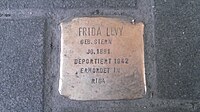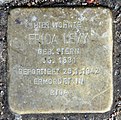Frida Levy
Frida Levy , b. Stern (born December 18, 1881 in Geseke , † 1942 in the Riga ghetto ) was a German activist for women and civil rights .
Live and act
Frida Levy was born in Geseke as the third child of the married couple Samson Stern and Johanna nee Leszynski. She became an orphan when she was sixteen. On September 26, 1899, after the death of her parents, she and her brother Ludwig moved to Berlin to live with an uncle.
On March 29, 1901, she married the lawyer Fritz Levy (1874–1936) from Elberfeld , with whom she moved to Essen . Fritz Levy practiced in Essen for over 25 years. There the couple had four children between 1906 and 1918. The Levys' house in Moltkestrasse became a focal point for young artists and intellectuals, so that readings by writers, lectures and discussions on art and politics were held there.
Frida Levy attended the Folkwang School and was in contact with artists such as Karl Schmidt-Rottluff , Josef Urbach and Gert Heinrich Wollheim . Before the First World War , Frida, together with women's rights activists such as Anita Augspurg and Minna Cauer, campaigned for women's suffrage and against the Prussian three-class suffrage in the Women's Welfare Association in Essen. She looked after workers' women and girls, for example, to enforce maintenance payments or represented them on labor law issues and rental matters, and she also wrote requests for poor people. Frida Levy was on the board of the German Association for Women's Suffrage . Together with Anita Augspurg and Minna Cauer, she campaigned for women's suffrage and against the reactionary three-class suffrage in Prussia. After the First World War, she worked in the International Women's Association for Peace and Freedom , where she expressed her pacifist stance. In addition, in lectures to young people, she dealt with taboo subjects that were socially taboo at the time, such as sexual problems in the youth movement, boys and girls in the labor movement, and youth and alcohol.
In February 1933 her husband Fritz Levy, who was a member of the SPD and a member of the Essen city council, was arrested, detained for eight days and then expelled from the city. In 1933 she and her husband went to see friends in Wuppertal . Fritz Levy died there on May 7, 1936 after a long period of Parkinson's disease . Frida Levy moved to Berlin to live with her daughter Hanna Herz and her husband Walter, who were both sentenced to several years in prison because of anti-subversive activities . Levy's other three children were already living in Palestine and Sweden . She corresponded with her daughter Hanna and her son-in-law Walter and thus kept in contact with the outside world, since prisoners were only allowed to write to relatives. Knowing the danger and out of consideration for Hanna and Walter Herz, Frida returned to Berlin in 1938 after visiting her daughters in Palestine. After her release in spring 1939, Hanna Herz emigrated to Sweden, but her husband Walter was deported to a concentration camp and murdered there.
Frida Levy did not want to emigrate, hide or commit suicide. She was deported to Riga on January 25, 1942 , where she died under unknown circumstances.
In September 2001 the comprehensive school in Essen-Mitte, the former Humboldt-Gymnasium, was renamed Frida-Levy-Gesamtschule ; the outer facade shows (sprayed) her portrait as well as the birthday and the year of death. A stumbling block was laid in the school's playground on June 27, 2005 in memory of Frida Levy as a victim of the Holocaust , and in July 2012 in front of her last apartment at Xantener Strasse 20 in Berlin.
Stumbling block in the playground of the Frida Levy Comprehensive School in Essen
Stolperstein on Xantener Strasse in Berlin-Wilmersdorf
literature
- Frida Levy Comprehensive School (Ed.): Frida Levy. 12/18/1881 to 1942 . 2nd Edition. Klartext-Verlag, Essen 2006, ISBN 3-89861-031-4 .
- Helga Altkrüger-Roller: Courageous women from Hameln & the surrounding area . GG-Verlag, Hameln 2012, ISBN 978-3-939492-39-9 , p. 27-36 .
- Erwin Dickhoff: Essen heads . Ed .: City of Essen - Historical Association for City and Monastery of Essen. Klartext-Verlag, Essen 2015, ISBN 978-3-8375-1231-1 , p. 224, 225 .
Web links
- Frida Levy (short biography)
Individual evidence
- ↑ Hermann Schröter: History and Fate of Essen Jews: Memorial Book for the Jewish Citizens of the City of Essen . Essen 1980, p. 201 f .
- ^ A stumbling block as a late honor for Essen Holocaust victim Frida Levy on www.derwesten.de from August 14, 2012.
| personal data | |
|---|---|
| SURNAME | Levy, Frida |
| ALTERNATIVE NAMES | Stern, Frida |
| BRIEF DESCRIPTION | German women's and civil rights activist |
| DATE OF BIRTH | December 18, 1881 |
| PLACE OF BIRTH | Geseke |
| DATE OF DEATH | after January 25, 1942 |
| Place of death | Riga ghetto |

